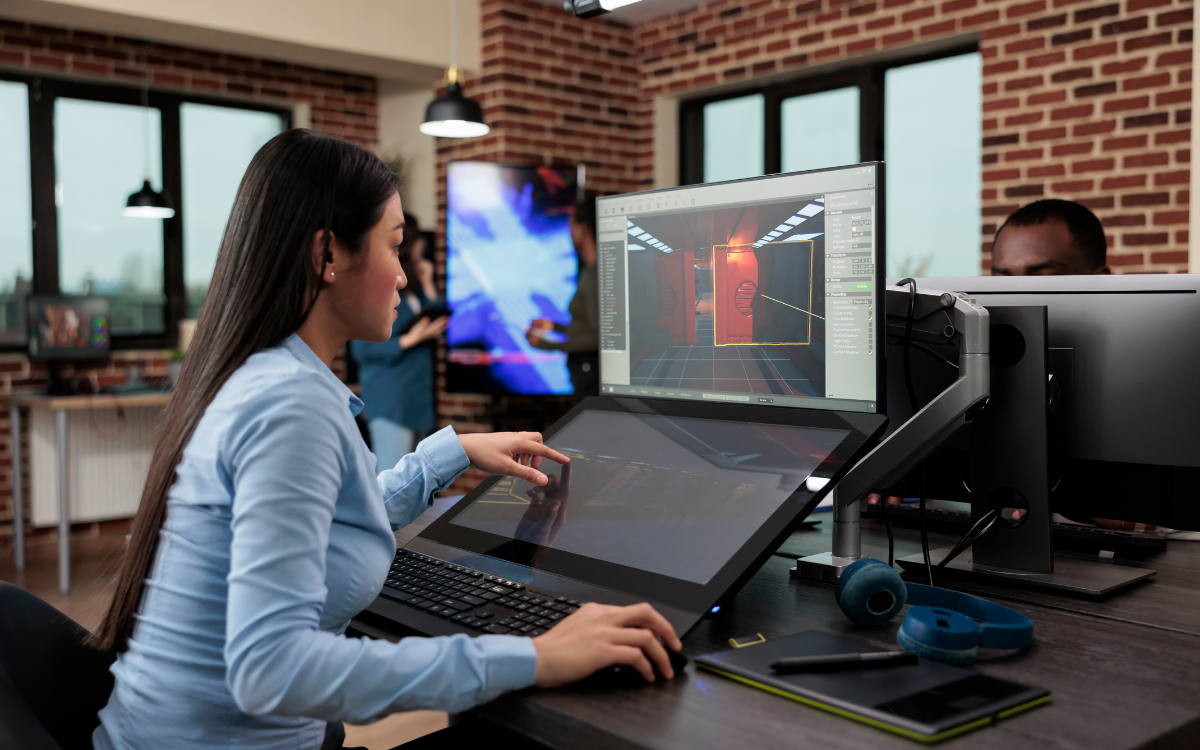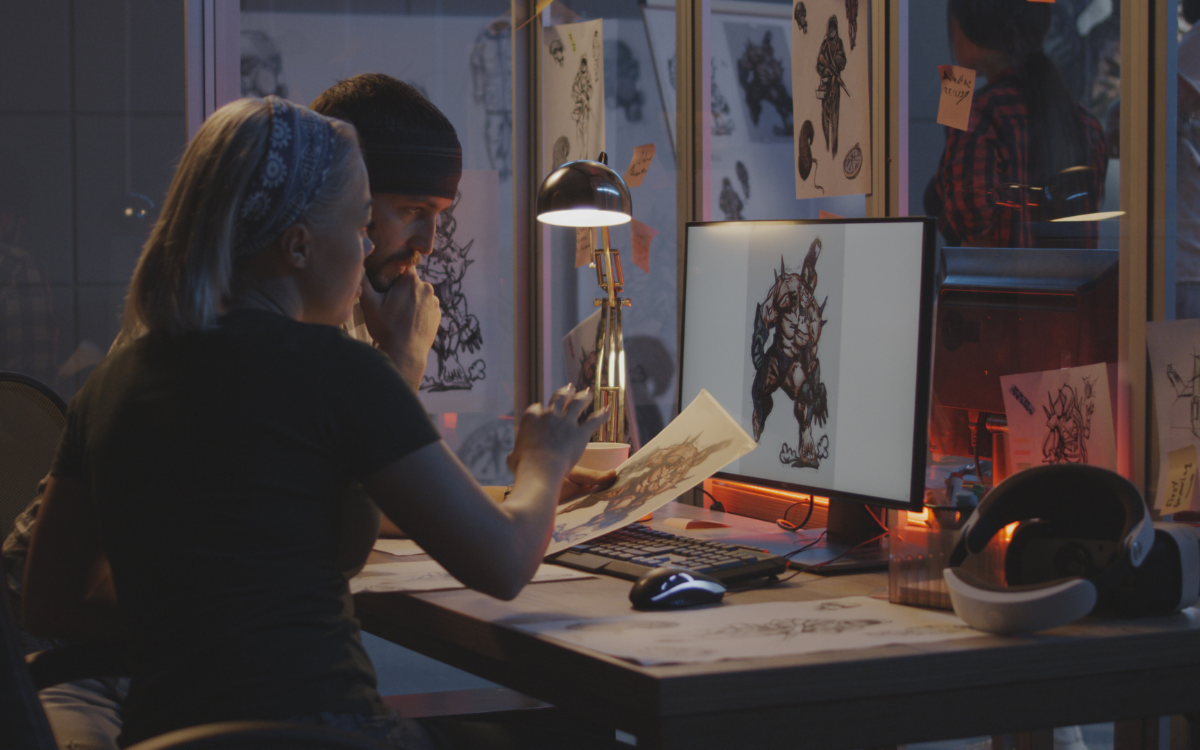Studying a game development degree can be a great way of enhancing your game development skills so you can secure a role in the booming video game industry.
Full of innovation, exciting computer science technology and driven by bold ideas, the gaming sector is dynamic and thriving. As the gaming market continues to evolve, there are plenty of job opportunities for anyone looking to launch a fulfilling games programming career or land their dream job in the games industry.
From quality assurance and game testing to promoting games, community management and developers getting to grips with gameplay, there are various gaming career paths available. Studying a game development degree is one of the best ways of preparing yourself to work in this sector, whether it be for game companies or for yourself.
If you want to hone your game development skills, then contact our team at SAE to learn more about the different courses we offer and how they can give you a great platform from which you can launch a successful games programming career.

Gaming Industry
As of 2024, the gaming world is a multi-billion dollar industry, worth an estimated $27.97bn (£21.5bn). With 10.84 million gamers in the UK, and a forecasted 6.64 percent community increase by 2027, there is a much anticipated need for more skilled tech and video game talent looking to forge successful games programming careers.
SAE is well prepared to help support this need with the 2023 launch of our Leamington campus. The town is known as ‘Silicon Spa’ due to the number of gaming and tech companies that have set up offices there.
The video game industry is clearly on the rise – new titles, different technologies, devices alongside an increase in mobile and cloud gaming are seeing the sector expand. The advent of AI is also expected to be huge with new demands on those with game development skills.
Dr Richard Wilson, boss of TIGA, previously told the BBC: “[AI] should allow games studios to make routine aspects of game development automated, and then use that space to be more creative and focus on other areas.”
“Reducing the overall cost of development will mean more games studios which should, therefore, mean more jobs.”
With this in mind, here are some of the games programming career opportunities that this booming gaming industry offers:
Video Game Artist
Video game artists are essentially graphic designers capable of creating 2D or 3D art for a game’s map or environment. Often working from design briefs or concept boards, their remit extends to landscapes, surface textures, characters and much more.
There are different tools they may need to know, including game engine software, audio editing and different modelling and animation software such as Autodesk Maya or Substance Painter. These skills are all taught as part of SAE’s game development degree.
Many will often be tasked with coming up with any special effects and establishing the use of colour palettes to capture a game’s look or feel.
Game Designer
The concept of a game alongside its aesthetic and different characters are the job of the game designer.
It’s an increasingly popular and important career with the role often at the centre of the team behind a game’s production. Depending on the size of a project, they could have to create a game concept, design how it looks and feels, build the game world and come up with the narrative including any characters or essential features.
Anyone wanting to work in this role will also need effective communication skills as they have to interact with different tech and creative experts.
Sound Designer
If you’re hearing a sound, piece of dialogue or effect when playing a game, then it’s likely that a sound designer will have been behind this.
They provide the soundtrack which can be an important element in enhancing the gaming world and allowing players to immerse themselves in the playing experience.
As with any other form of visual media, the sonic experience in games can be integral when following a narrative or setting the mood. It’s a versatile role with sound designers often needing to be able to create audio of all kinds – from music and scores to ambient effects and natural sounds.

Game Developer
Game developers can often be found working at the heart of a video game.
From concept and design to programming, testing and debugging, it is down to these professionals to ensure a game is playable across a range of formats.
It will be the responsibility of the game developer to design the mechanics and dynamics of a game to make the user experience as smooth as possible. Our students often gain experience of this by working together during their studies to plan, pitch and deliver a game from drawing board to final product.
Video Game Writer
From Mass Effect 2 to Life is Strange, many video games have spiralling, epic story lines for users to enjoy and immerse themselves within.
Video game writers are responsible for these plots, often working on developing dialogue, characters and any essential backstory details that help bring the narrative to life.
Their role will usually work in tandem with designers and artists to make sure the plot aligns with the game’s aesthetic.
Producer
Many video game producers work like project managers to make sure any game is completed to deadline and in line with any financial or budgetary constraints.
Rather than creative, this role is business-focussed and ensures that different departments/team members are communicating with each other and collaborating effectively. The producer will usually oversee each phase of the video game development and work with marketing teams and other business executives so the game reaches the end-user.

Video Game Programmer
Behind the look and feel of a game are the mechanics that power the game – and it’s the role of the video game programmer to work on the software that can do this.
Programming languages such as C++ and C# alongside knowledge of industry software, including 3ds Max, Unreal Engine 5, Maya and Unity3D, all feed into this role.
You will need to write code to make a game function, work collaboratively with artists and animators and support any unique gaming requirements.
Game Tester
Functionality and user-friendliness are essential attributes for video games and it’s down to game testers to ensure game quality and a lack of glitches.
It’s the feedback of these testers that enable developers to iron out any issues with the gaming experience. They also run through any tutorials or instructions to ensure these are useful and align to the gaming experience.
Community Management
A game studio relies on its community manager to look after any social media channels or online forums surrounding a game.
It’s down to these professionals to engage effectively with an audience to not only maintain it but also grow the number of players excited and interested by a game. For example, this is an integral role in the marketing and promotion of huge gaming brands such as Minecraft or Fortnite. With the latter, there are an estimated 650 million registered players.
By building effective relationships among this community, then player loyalty can be deepened and satisfaction levels boosted.
Animator
Animators often collaborate with artists and writers to work on bringing the characters and other elements of the game to life to support its story.
Essential skills include animating objects such as parts of the landscape and gaming environment to ensure it is more realistic. They also allow any game characters to move and have facial expressions too. A knowledge of industry-standard software such as Autodesk Maya and Substance Painter can be very useful for this role.
Study Game Design and Development at SAE
From Game Programming to Game Development and Design, we offer a variety of game development degrees for aspiring industry professionals and creatives.
Find out more about our Games degrees and contact our team for more information.


































